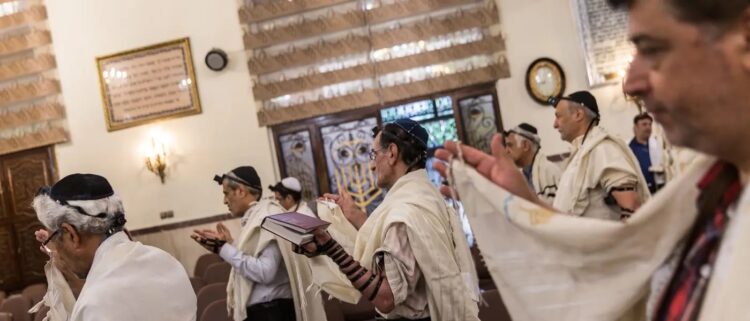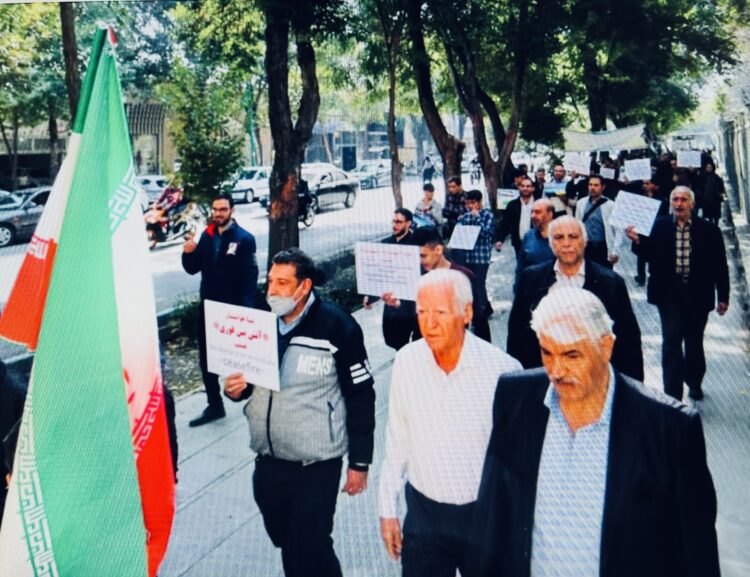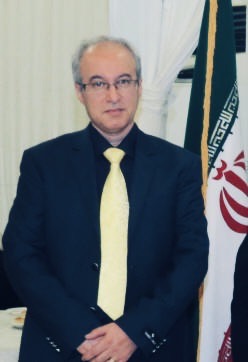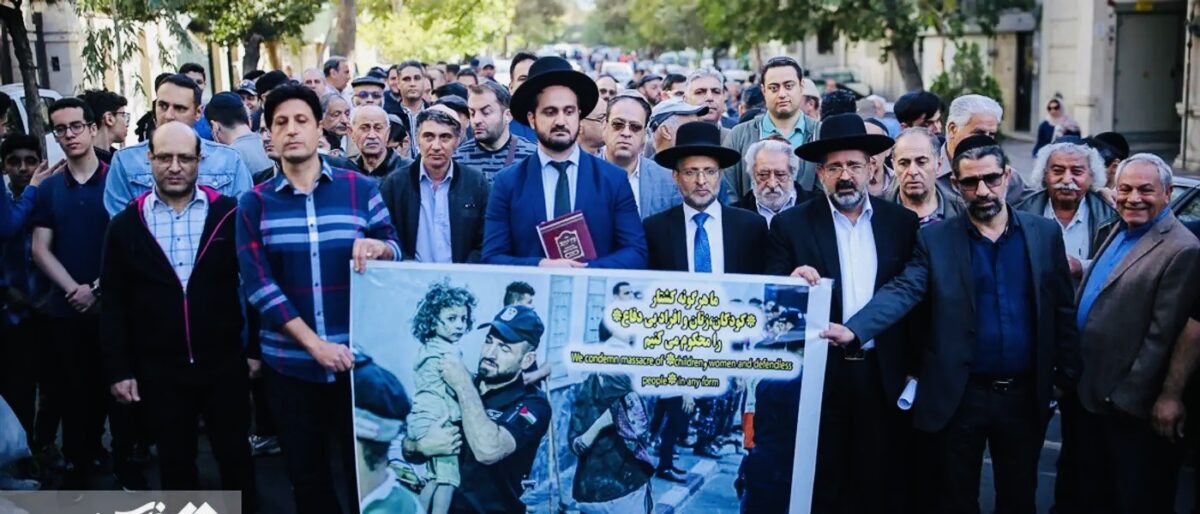Jews in Iran are in a delicate and vulnerable position.
As citizens of the Islamic Republic of Iran, they are loyal to a country at war with Israel and committed to its destruction.
Yet, as Jews, they are caught between the hammer and the anvil, knowing full well that their generally positive feelings toward Israel, the so-called Zionist enemy, could land them in serious trouble and bring disaster upon the Jewish community.
Beni Sabti, an expert on Iran at the Institute for National Security Studies at Tel Aviv University, claims that the Jewish community is under “silent pressure” to abide by the dictates of the theocratic Iranian regime.
This is most probably true.

The Iranian regime exploits the community’s vulnerability for propaganda purposes, secure in the knowledge that dissident voices will remain complicity silent to conform with the ideological needs and policies of its leadership.
Two examples will suffice.
Iranian Jews lashed out at Israel following the October 7 massacre, during which Hamas terrorists killed roughly 1,200 Israelis and foreigners in southern Israel.
Most recently, Iranian Jews applauded Iran’s unprecedented drone and missile attack on Israel on April 13 in response to Israel’s bombing of Iran’s consulate in Damascus on April 1, which caused the deaths of three Islamic Revolutionary Guards Corps generals and four lower-ranking officers.
Representatives of the community reportedly attended demonstrations honoring the Iranian “martyrs” killed in Syria. And within hours of Iran’s aerial assault against Israel, which was almost completely foiled by Israel, the United States, Britain and Jordan, the Jewish community in Tehran posted comments on its Telegram page commending Iran’s armed forces for “punishing the Zionist enemy.”

On October 30, hundreds of Iranian Jews took to the streets in Tehran, Isfahan, Shiraz and Kermanshah, holding aloft placards and banners in Farsi and English condemning Israel for its military offensive against Hamas in the Gaza Strip.
Yehuda Gerami, Iran’s chief rabbi, told congregants at the Yusef Abad synagogue in Tehran that Israel was committing war crimes in Gaza.
His colleague, Rabbi Younes Hamami Lalehzar, said that Israel needed to reassess its approach to the Palestinians: “If the Zionist regime comes to its senses, it must understand that its strategy in Palestine won’t be successful in the long term.”
Iranian state news agencies covered the anti-Israel rallies, photographing, filming and interviewing participants.
Iran’s United Nations mission in New York City compared the demonstrations to pro-Palestinian protests mounted by anti-Zionist Jewish organizations in the United States such as Jewish Voice for Peace and IfNotNow.
The U.S. State Department dismissed the Jewish protests in Iran as coerced and stage-managed: “It is reprehensible that the Iranian regime continues to pressure religious groups to advance its propaganda.”
Iran, with a population of 90 million, is home to about 9,000 Jews, down from 20,000 only a few years ago. Though the community has been greatly depleted by emigration in the past seven decades, it is still the second largest one in the Muslim world after Turkey.
When the Islamic Revolution broke out in 1979, 100,000 Jews lived in Iran. Under the previous Pahlavi monarchy, Jews fared relatively well, and Iran and Israel had cordial relations. With the ouster of the monarchy, Jews left in droves, mainly immigrating to the United States and Israel.
Jews, Christians and Zoroastrians are the only recognized religious minorities in Iran. Jews are allotted one seat in Iran’s parliament.
Iran’s constitution forbids discrimination on the basis of race, stating that non-Muslims should be treated in accord with the principles of “Islamic justice and equity,” and that their human rights should be respected as long as they do not act against Islam or the state.
Yet non-Muslims may not hold senior government, intelligence or military positions, and the principals of schools must be Muslims.
According to the U.S. State Department, Iran’s school curriculum is rife with antisemitic rhetoric and “heinous” descriptions of Zionism.
The Bahai’is, a minority whose international headquarters are in Haifa, have been mistreated.
Iranian Jewish leaders have faithfully supported the policies of the Islamic regime, knowing full well what the consequences would be if they do not parrot the party line.

In 2019, in a rare event, Iran’s Islamic Revolutionary Guard Corps and Muslim clerics participated in a Jewish religious memorial ceremony in Tehran’s Jewish cemetery in honor of the 13 Jewish soldiers killed during the Iran-Iraq war, which lasted from 1980 to 1988. In footage broadcast on Iranian state media, members of the corps were seen saluting the graves and Jews could be heard reciting the mourning prayer in Hebrew.
Six years earlier, Jews rallied in support of Iran’s nuclear program, which Israel regards as a potential existential threat.
In 2020, Jews extended condolences to the widow of Qassem Soleimani, the commander of the Quds Force who was assassinated by a U.S. drone strike in January of that year.
Two years ago, the Jewish community in Tehran condemned anti-regime protests in Iran, with the Tehran Central Jewish Association endorsing the government’s deadly crackdown on protesters.
Over the years, the Jewish leadership has regularly excoriated Israel.

In 2020, Homayoun Sameyah Abadi, the chairman of the Tehran Central Jewish Association, said that he and his fellow Jews regard Israel as “an enemy that must be fought.” He claimed that Israel is “a Zionist political entity that has no religious value. Real Jews do not recognize Israel, and see in (it) a violation of our faith.”
“Unfortunately, the Zionists have abused the name of Judaism, attempting to buy credibility for themselves in the international community,” he added, urging the international community to recognize the difference between the actions of Israel and the beliefs of Iran’s Jewish community.
According to Abadi, Iranian Jews “enjoy full religious freedom,” and not a single synagogue has been attacked in Iran since the establishment of the Islamic Republic.
Zion Mahgrefteh, the leader of the Jewish community in Isfahan, has denounced Israel for its role in Gaza. In a statement, he said, “We, the Jews of Iran, together with all the free Jews of the world, condemn the crimes of the Zionist regime and consider the governments that support this regime to be complicit in these crimes and the killing of the defenceless people of Palestine.”
“The behavior of this brutal regime is in sharp contrast to the teachings of Judaism and the Holy Torah,” he noted. “We sympathize with the oppressed people of Gaza, who have been under siege by the Zionist regime for a long time and are now deprived of basic necessities such as water, food, and gas.”
Siamak Morehsedgh, a former member of the Iranian parliament, has denounced Israel’s “mistreatment of the Palestinians,”constantly flailed Israel, and called for its destruction and the “liberation of Jerusalem” from the Zionists.

Yehuda Gerami, Iran’s chief rabbi, has said the regime is tolerant of Judaism, having allowed Jewish schools to close on Saturdays for the Sabbath and to renovate a Jewish ritual bath, or mikveh, in Tehran.
“Also, we now have about six kosher restaurants in Tehran, two in Shiraz and two in Isfahan, with a higher level of observance of Jewish dietary laws than before,” Gerami said. “And we opened a Jewish seminary in Tehran where dozens of young men learn to become rabbis and to conduct ritual animal slaughter. They then return to their cities to teach and spread holiness.”
Asked how he feels about Iran’s confrontation with Israel, where he studied during his youth, Gerami responded cautiously, according to open sources: “We always keep in mind that we have no interest in politics. We are Jews who only want to learn the torah and perform good deeds as a religious duty.”
Iranian Jews, though not oppressed, live on the precipice in a nation whose clerical regime is dedicated to Israel’s destruction. Jews are tolerated as dhimmis, but they live precariously, not knowing what lies around the corner.
In this respect, they may be living on borrowed time.
